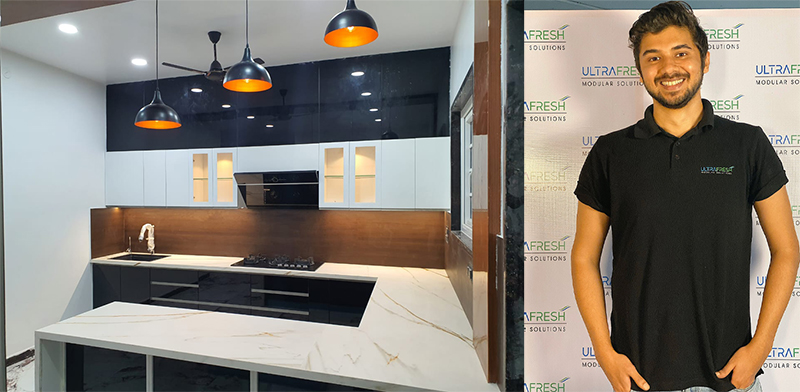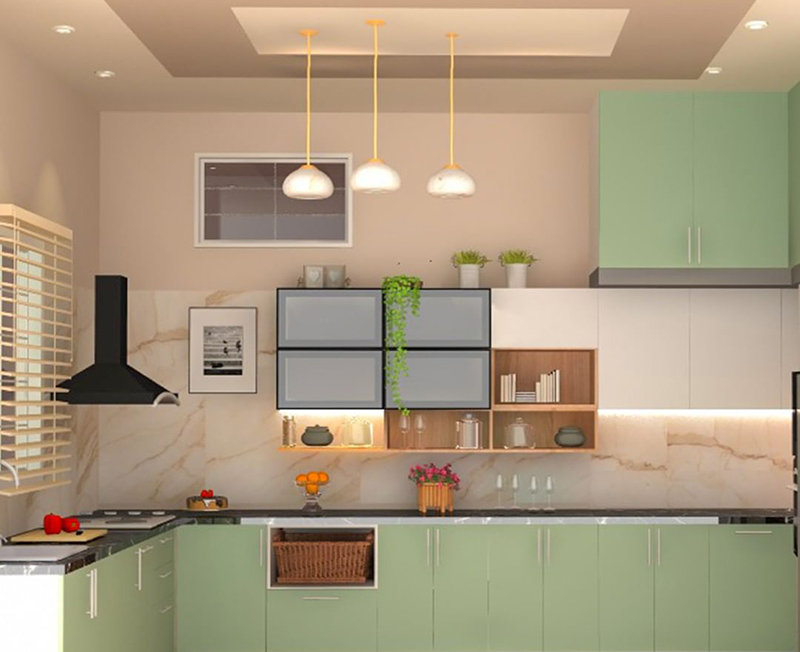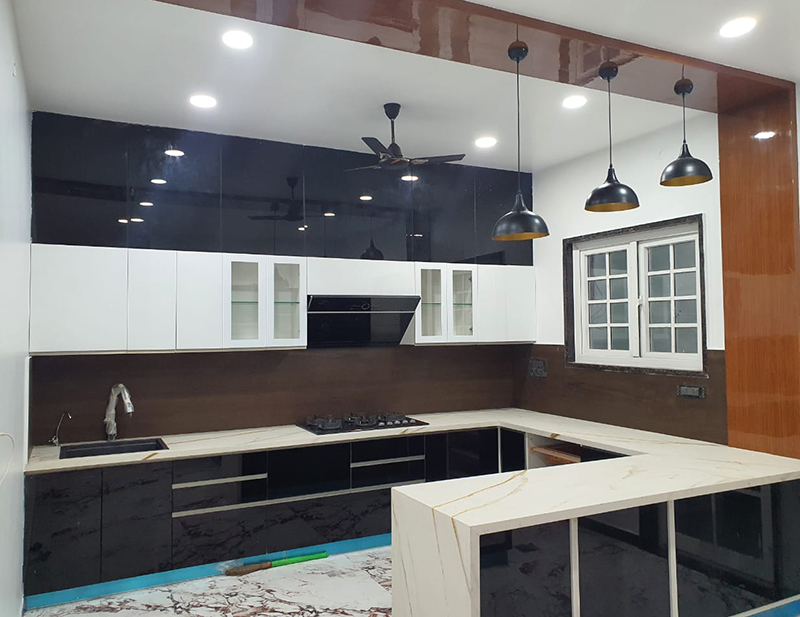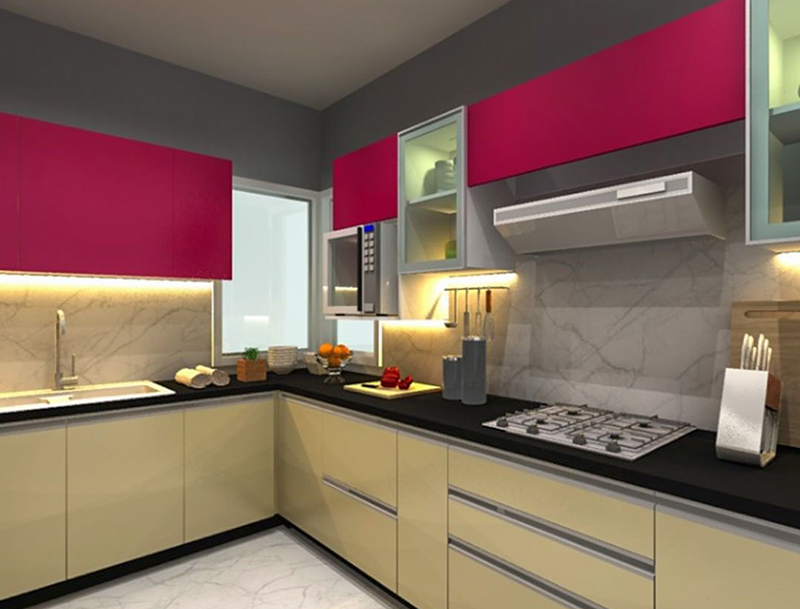 Ultrafresh Prestige
Ultrafresh Prestige
Know-how of Prestige management biggest gain for Ultrafresh: CEO Dhruv Trigunayat
Ultrafresh Modular Solutions Ltd has been established as an autonomous subsidiary of TTK Prestige with the recent 40 percent stake acquisition. It has over 150 kitchen studios and experience centres across India with about 75 percent of these showrooms being situated in Tier II and Tier III geographies. In an interview with IBNS correspondent Anuradha Dutta, Ultrafresh CEO Dhruv Trigunayat opens up about the synergies across the brands, products, channels, and manufacturing capabilities post the acquisition and the company's roadmap to achieve the top position in the country's modular kitchen space.
How are your growth figures post the merger with Prestige?
We started discussing a merger with Prestige in November 2021 and we announced it only in June when we inaugurated our Bengaluru experience centre. It has been only three-four months since we started using the brand name properly and that has resulted in huge changes in business, both on the franchisee side and the B2B side. Now, large businesses are much more confident to give us 100--200 kitchens.
How much revenue growth do you expect by 2025?
Our speed of growth is very high this year. We expect to gain market leadership in the next 18 to 24 months. As the industry is very unorganized, we don't know the exact number but it would be somewhere between 100 to 200 crores. By 2025, we are very confident about significant growth. Even during the pandemic, Ultrafresh grew 50 -60 percent year-on-year. We did not lose a single manpower though we didn't add a single store. There was no downsizing. In terms of revenue growth, at least for the next three years we will be able to grow 2 to 3 times. By 2025, we are looking at growing to Rs 500 crores in terms of the top line.
Is cross-marketing helping you?
It's going great. It helps us in two ways. One--the ticket size of the customer goes up, and the same customer who is buying a kitchen from us is also now buying Prestige kitchen appliances like cooktops, chimneys, and OTG; two—increase in brand value--everyone knows the brand Prestige, every kitchen will have some Prestige product. Now when we go to customers, we don't have to explain who we are. We can straightaway talk about our products and services. From a brand perspective, immediately it has given us business and customer acquisition ticket size has started going up.
Do you have any plans to add more manufacturing units?
We have a manufacturing unit in Himachal Pradesh in Baddi. Right now, we are at around 18 to 19 percent capacity utilisation of our factory. There won’t be a need to add any more manufacturing capacity till 5x growth maybe. Probably after two or three years, we will add more Capex in the south as we will be serving the southwest and northeast more.
In the south where do you plan to build a new manufacturing unit?
It depends, as Prestige has over nine to ten factories in the south. One of the biggest things that have come on board with Prestige -- more than the business more than the brand -- is the know-how of the management. Their management gives us a lot of insights about how to work and which areas we need to focus on. We have autonomous control, so, no one interferes with how we run our business but wherever we need help we can go to them.
Being a young team, we don't have the experience of opening many factories or warehouses. So, it helps us a lot in terms of guidance. We wouldn’t have to burn our own fingers experimenting with big capital investment. They have such big manufacturing setups that they know how to make profitable factories and we should be able to replicate them.

Which regions are your biggest markets in India for you?
The east has already been a strong market for us for a while. The biggest processing currently is in the south because Prestige being a south India-based company, we are getting the leverage of that brand value in the south. So the South is growing the fastest. The next biggest growth is coming in the west zone.
How different is your new experience centre in Bengaluru’s Koramangala from the existing ones?
The first 80-90 Ultrafresh stores came up between 2018 to 2021 in a certain format. After Prestige came on board, we have been looking at business synergy. So, all of our new stores that are opening are like our Bengaluru stores. It is not possible to fully revamp the old store because of space limitations, but we have rebranded them. If you go to those old stores now, it's "Ultrafresh powered by Prestige". We have some 160 showrooms now and Prestige has 750. In all our 150 stores we are having Prestige products.
Are you collaborating with construction companies for modular kitchen installations in their projects like other home interior and renovation companies?
Our bread and butter is B2C, and sales come mostly through direct customer dealing. So far, we have done 5,000 kitchens and most of it has been to end customers. Earlier, we did not have a risk appetite. We were very sceptical and conservative to get our hands on that. Now that we are funded, we are more risk open to take up bigger projects. For example, we did a Rs 50 lakh project for the Indian Navy in Kolkata, a project for Reliance in Jamnagar for Rs 1.5 crore in the last quarter. We have picked up a Rs 200 crore kitchen order in Mumbai. We assume in future, 20 percent of our business will come from institutional and about 80 percent from end customers.
How affordable are Ultrafresh kitchens?
Our product range is slightly lower in the east. In terms of the average value, it is around 1.5 lakh to 2 lakh rupee kitchens here. Traditionally, across the country, it would be around 2.5 lakh to 3 lakh rupees our average kitchen price. We are positioning Ultrafresh modular kitchens somewhere between the carpenter and what other brands are giving. The perception that modular kitchens are very expensive for most people is wrong. A lot of our branding and advertising has to make people aware that modular kitchens are affordable and bring better value for money. To make our kitchens more accessible we have launched an EMI scheme with HDFC.
What are your unique offerings?
Our steel kitchens are our unique offering, which make up 60 percent of our volume. Steel kitchen is a very different concept. Only Godrej and Ultrafresh are the two upscale brands that sell steel kitchens. Steel kitchens are more durable because of the termite problem in India and also the hot and humid weather. Against the common belief that steel kitchens are not aesthetically pleasing, we have taken steel kitchens aesthetically to the level of wooden kitchens. There is a huge demand for steel kitchens in Tier 2 and Tier 3 cities.
How well do you think the modular kitchen market is likely to grow?
Right now in India, less than one out of every 100 kitchens that is made here, is a factory-made kitchen. Out of that less than 1 kitchen, fewer than 20 percent are branded and 80 percent are non-branded. So, a minuscule 0.2 percent of the total available addressable market is organised kitchen, which means the whole field is open. In many cities, we are the only organised player there.
All the players are going to grow at least 30 percent to 40 percent just because the size of the market is so big and the organised sector has penetrated little. The biggest growth drivers are going to be the organisations and Tier 2 Tier 3 cities like Indore, Lucknow, Chandigarh, Jaipur, coming at par with the metro cities. And, I see that process happening very quickly.
Has inflation made your product range costlier?
We took one price rise of 5 to 10 percent in January but after that, March-April onwards, prices of a lot of commodities have sort of stopped increasing, resulting in a lot of normalisation. So, we have not taken a price hike after January. Freight costs have gone up. But gross margins are not suffering. We are not looking at any further price rise because we also want to remain competitive at this phase of our growth.

Who are your competitors?
Sleek backed by Asian Paints and Godrej. Those are the two biggest competitors because they are in the same space as us. Home solutions like Livspace, and Homelane have started coming in but for them, the kitchen is a very small part and the rest of the whole house is the bigger business for them. And, there are many localised and regional players who are very solid. Kutchina in the east is big. Makwana is also there.
Tell us about the launch of your latest and upgraded products.
Currently, what we see in the modular kitchen segment is that in the name of innovation people are just copying and pasting designs trending in Italy and Germany. But we feel that Indian cooking and the way it's done is very different. Our climate is very different which changes the choice of material entirely.
Functionality tops our design focus which we do by interacting with the end customer. By end customer, I don't necessarily mean the person who pays for the kitchen but the person who is the boss of the kitchen. They know the requirements like functionality, storage, and accessibility among other things.
To achieve this, we are launching a new tech platform to interact with customers. It is a complete KYC to know the smallest details about your kitchen needs. Ours is not one size fits all. Once the customers tell their requirements, they can immediately see the options available for one lakh rupees to five lakh rupees.
Are your kitchen fit for old houses also?
30% of our business is renovation. 70% is new homes. It changes seasonally but that is the usual business we do.
How are your various product categories doing in the Eastern region?
It is my biggest region so I feel it is always doing well in terms of the modular kitchen market. Our product categories include modular kitchens, Wardrobes, TV units, and bar units and now we have added kitchen appliances after coming together with Prestige. Other than that, nothing. We only want to look at the kitchen. We want to be space experts.

What is your market share in the country among organised players?
It may be around 5 percent. It's a ballpark number as we cannot assess how big the business of our competitors is in the modular kitchen segment.
How do you see the inflation impacting modular kitchen business, which is your biggest segment?
As the real estate sector has done very well in the last 12 months, we are sure our market will also expand. Due to inflation, buyers’ disposable income may have gone down, causing a reduction in the ticket size but the number of customers to acquire remains the same.
In Tier 2 cities, there is still a lot of disposable income available. Given the performance of the real estate market, I don't think there will be a big effect on us right now. The lag effect might come one or two years down the line.
How are you going to use the proceeds of the merger with Prestige?
It will be a mix of capex and opex but majorly capex. We have expanded factory capacity, and added some warehousing to improve distribution. We are investing heavily in the tech that I spoke about. So, all of this is under capex. Not much of opex is required because this is a cash flow-positive business. The rest of it will go to brand-building efforts. Largely, we are looking at capacity building and technology.
Support Our Journalism
We cannot do without you.. your contribution supports unbiased journalism
IBNS is not driven by any ism- not wokeism, not racism, not skewed secularism, not hyper right-wing or left liberal ideals, nor by any hardline religious beliefs or hyper nationalism. We want to serve you good old objective news, as they are. We do not judge or preach. We let people decide for themselves. We only try to present factual and well-sourced news.







